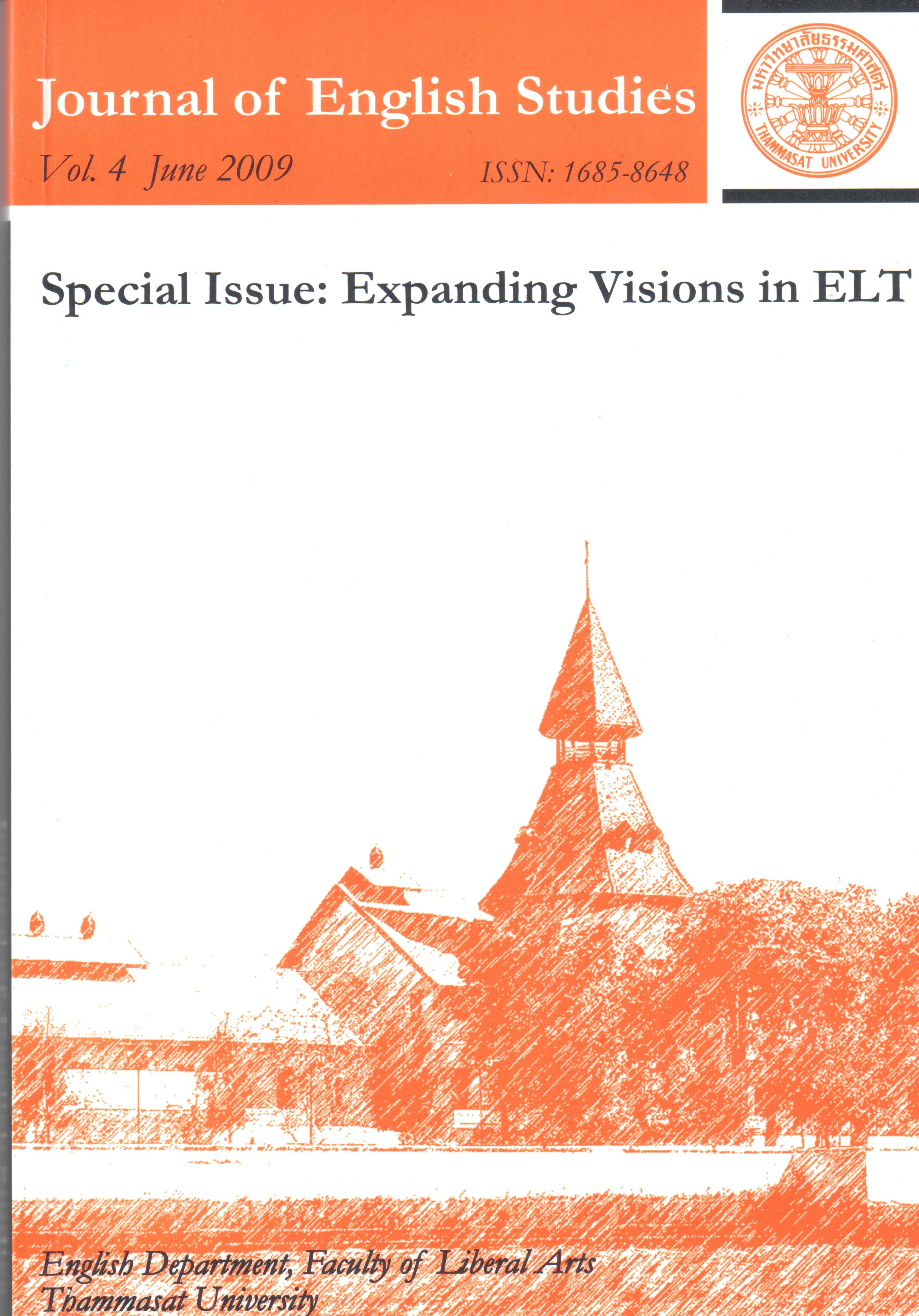Note from the Editor
Main Article Content
Abstract
We are pleased that the publication of this special issue of the Journal of English Studies coincides with the conference of the English Department, Thammasat University, whose theme is “Expanding Visions in ELT”. For those who are able to attend the conference, we are sure that the papers contained in this issue will give you further food for thought.
You may notice that this issue of the Journal of English Studies has a new look, which we hope not only improves the appearance, but makes it easier to read. The changes are not only in presentation, however. We have a new editorial board by which we aim to achieve collaboration among experts from leading universities in Thailand, improving quality. All articles are peer-reviewed and we are most grateful to those who have given up their time to assist in this task.
This issue begins with a controversial paper which challenges current trends and practice in EFL from a Liberal Arts perspective. In The Paradox of University EFL: A Liberal Arts Subject without Liberal Arts Content, Ross Taylor reviews the history of Liberal Arts teaching and argues that certain features of EFL teaching have created confusion and inconsistency in the content that accompanies language teaching to the detriment of students and the Liberal Arts tradition. Saneh Thongrin then raises the issue of the difficulties posed for EFL writing teachers and learners. In Collaboration for Liberation: Using TIMET to Enhance EFL Students’ Writing Skills, she provides us with the outcome of some of her research into collaborative writing, using the TIMET model she has developed, which allows students to make effective use of their local resources in their writing. Following this, in Generic Structure of Research Article Abstracts in Sciences, Budsaba Kanoksilapatham illustrates how genre analysis can be used to explore organizational patterns prevalent in a set of scientific abstracts from multiple scientific disciplines and the pedagogical implications of such analysis.
Research into issues facing ELT in Thailand and elsewhere frequently overlooks the ELT practitioners themselves. There is a tendency to focus on “practice” rather than “practitioner”. Whilst practice is fundamental, it is likely to be well below an optimum level if practitioners feel dissatisfied in their work. This difficult and sensitive issue is tackled in “To Their Fullest Potential”: Job Satisfaction and Foreign University Teachers in Thailand. Thomas Hoy presents the results of a research project into job satisfaction amongst foreign university teachers in Thailand with interesting results, drawing some challenging conclusions and providing constructive suggestions for improvement. In Developing a Pedagogy for Active Learning (PAL), Willard Van De Bogart provides an interesting brief history of active learning in Thailand and argues that active learning can support the conceptual development of the learner, presenting the results of a case study at Nakhon Sawan Rajabhat University.
Finally, Pragasit Sitthitikul, in his discussion paper, Understanding L2 Acquisition in English Language Learners: The Interplay of Age, Cognitive, and Sociocultural Factors, And their Implications for Instructional Practices, reminds us of important features of second language acquisition and highlights differences between L2 acquisition in adults and children, leading to suggestions for improved pedagogy for young L2 learners.
We are sure that you will enjoy the articles we have selected for publication in this issue and that they will provide stimulation for further thought, research, and debate.
In the future, we plan to publish the Journal annually, every June. In addition, we are in the process of arranging for this issue and back issues to be available online. Those interested in submitting papers can see further the call for papers in this issue.
Finally, I would like to thank all authors, reviewers and proofreaders for their substantial contribution to this issue. Special thanks to Dumrong Adunyaritthigun the Department Head for his help on various practical and administrative issues, and to William Page and Simon Stewart for their meticulous proofreading job.
Article Details

This work is licensed under a Creative Commons Attribution-NonCommercial-NoDerivatives 4.0 International License.
Authors who publish with this journal agree to the following terms: Authors retain copyright and grant the journal right of first publication with the work simultaneously licensed under a Creative Commons Attribution License that allows others to share the work with an acknowledgement of the work's authorship and initial publication in this journal. Authors are able to enter into separate, additional contractual arrangements for the non-exclusive distribution of the journal's published version of the work (e.g., post it to an institutional repository or publish it in a book), with an acknowledgement of its initial publication in this journal. Authors are permitted and encouraged to post their work online (e.g., in institutional repositories or on their website) prior to and during the submission process, as it can lead to productive exchanges, as well as earlier and greater citation of published work (See The Effect of Open Access).

